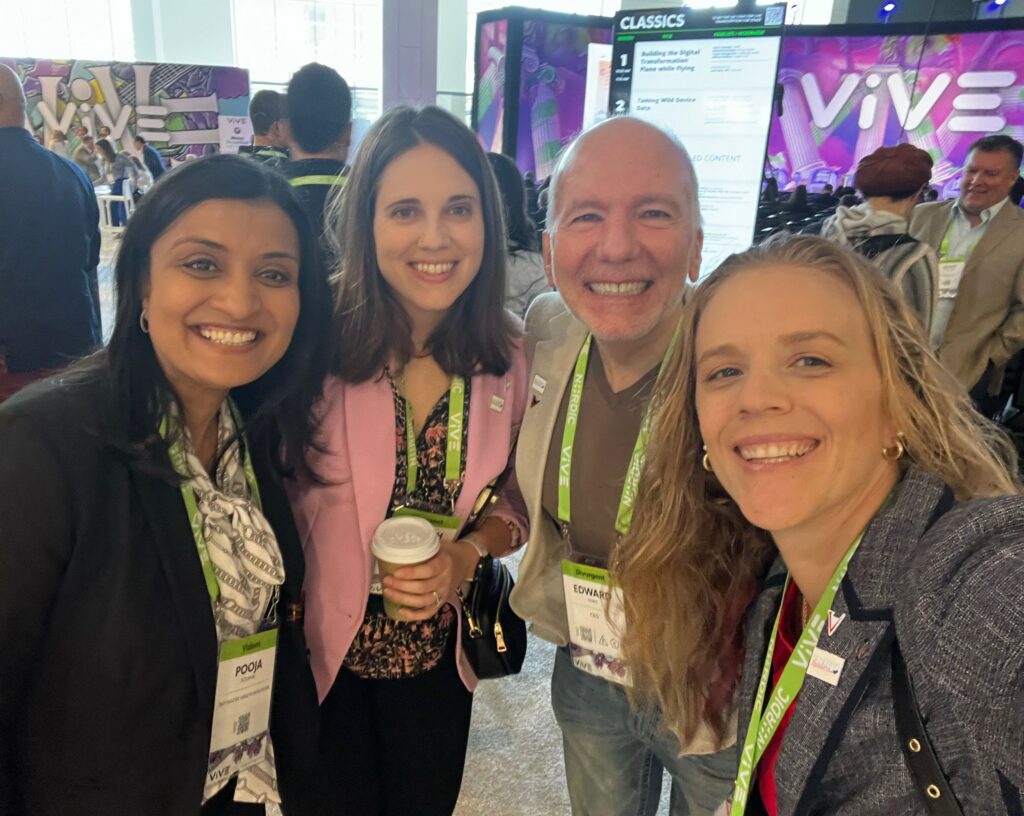Produced by The College of Healthcare Management Executives (CHIME) and HLTH, ViVE is a premier conference event held for senior digital health leaders around healthcare IT innovation and business transformation. This year’s ViVE Conference was held in Nashville, Tennessee at the Music City Center, and covered many pertinent themes – like AI, managing costs, and access to health care.
Divurgent had a Team of attendees that included Ed Marx (CEO), Shane Danaher (COO), Hannah Ellerbee (CCO), Jessica Hadley (VP), Ben Hintz (Sr. Director), Katherine Isaza (VP), Liz Keller (SVP), Christopher Kunney (SVP), Todd Mingo (SVP), Adam Tallinger (EVP), Steve Weichhand (SVP), and Rebecca Woods (EVP). Along with ViVE’s important topics and fun-filled agenda, Divurgent participated in and held events of our own, including:
- Sponsored and participated in the Opioid Task Force Charity Golf Tournament
- Held two book signing events for CEOs Ed Marx (Divurgent) and Sherri Douville’s (Medigram) latest book Advanced Health Technology – a #1 new release in medical technology
- Organized morning fundraising runs where runners could donate to the Girls on the Run foundation
- Hosted a musical event at Rare Bird Rooftop Bar for healthcare and healthcare IT leaders
- Co-hosted the Women at ViVE Reception, with EVP of Growth Rebecca Woods, that focused on women in healthcare IT, medicine, and entrepreneurship
- Held our anticipated “Ed Marx the Spot” – an invite only, nightly cocktail and conversation event for healthcare leaders in a “secret” location
It is with great sadness to also note that during the conference, a horrific event unfolded in Nashville that rattled the nation. To give back to the families of the Covenant School victims, ViVe organizers have donated $50,000 and created a GoFundMe donation page where anyone may donate. A moment of silence was given during the conference for all attendees, and many speakers acknowledged the tragedy and the need to address gun violence and mental health.


Our Top 4 ViVE Takeaways
Though many important topics were covered throughout the ViVE 2023 conference, these were our Team’s top overall takeaways:
1. Cost Savings
Hospitals are hurting financially, making both short-term and long-term cost savings a top priority and topic on the agenda. Health systems are needing to be more conscious than ever when choosing their investments – including those for digital health. Most vendors are beginning to offer new or upgraded products and services that enable cost savings, which also requires health systems to choose carefully and purposefully those with proven experience and track records.
During conversations with many C-level figures, return on investment (ROI) for existing investments was a main concern. Few existing IT investments are validating whether ROI is being realized, and for many it feels as though without the impact of investments being tracked, they’re likely spending more than is being saved. With unrealized revenue – and revenue that is falling sharply – maximizing current investments, increasing revenue, and optimizing workflows need to be a top focus for health systems.
2. Staffing Shortages
For several years, health systems have all been bearing the brunt of one thing – staffing shortages. The reasons behind staffing shortages are complex. The main reasons being healthcare professionals are experiencing burnout and are exiting the workforce, less students are enrolling and entering the field, and there is an influx of the population needing a high amount of care. With it being such an urgent issue, it comes as no surprise that this was well discussed. Unfortunately, many conversations talked of the current issues and how to prepare for them instead of considering opportunities to solve the issue.
There is an opportunity here for technology and innovation to step in and support the burdened healthcare workers. Tech must become the driving facilitator of efficiency and productivity that helps people provide more with less.
3. Techquity
The potential for Generative Artificial Intelligence (AI) applications, like ChatGPT, to be used in healthcare was commonly discussed throughout the event, and along with it the “techquity” buzzword. This buzzword applied to three different, yet interwoven, areas. The first being that patients receive equal access to tech, including those who don’t have the means to own or get to places with high tech solutions – such as smartphones, internet, or more advanced tech. Second, that all bias must be monitored and removed from AI, Machine Learning (ML), and data analysis models. And lastly, that technology should always be in consideration of the diversity, equity, and inclusion (DEI) needs of patients.
We should also not look to AI as the be-all end-all solution, but as a tech enabler that allows for an improved and more efficient way to provide healthcare. In order to continue using intelligent tech in healthcare, we must build trust in these technologies. We need to own and acknowledge their use in the past, we need to develop governance and accountability in its use, and we need to prove that it does provide safe, equitable, and beneficial outcomes for all patients.
4. Home Care & Remote Patient Monitoring
Home Care is a trend that does not seem to be slowing down. More and more people want to avoid unnecessary visits to hospitals and clinics and are wanting to receive as much care as possible from their home and alongside the care of their families. While care is being provided at home, Remote Patient Monitoring technologies enables providers to monitor patients outside of the conventional clinical setting, allowing them to manage acute and chronic conditions affectively and at a distance.
There are ample opportunities of the development and improvement for technology to allow providers to do more for patients at home while data and results are sent back electronically in real time. With this being a newer trend that is still rapidly developing, the unanswered questions to consider are these: What is the future payment model for home care as these needs increase? What will payers and providers do with this data? And who will be responsible for reviewing this data?
Accelerate your organization’s digital efforts!

About the Author

Amanda Sorg | Copywriter & Content Manager
Amanda is the Copywriter & Content Manager at Divurgent. She focuses on strategizing and creating impactful, meaningful content that drives the connection of readers and clients to the Divurgent community and offerings. She received her Bachelor of Arts degree in Psychology and Anthropology from the University of North Florida and holds certifications in Digital, Content, and SEO Marketing. To learn more about Amanda, visit her on LinkedIn.


